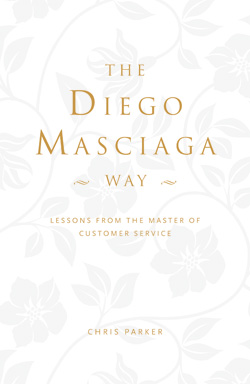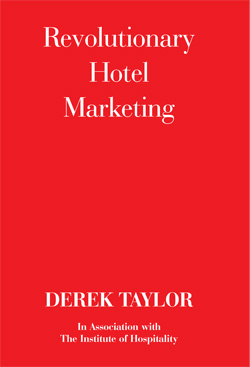Words from the wise: Customer service and marketing skills
What can hospitality operators learn from the customer service and marketing skills of two legendary masters of the disciplines? Peter Hancock, chief executive of Pride of Britain hotels, relates the wit and wisdom of Diego Masciaga and Derek Taylor in these two books
By Chris Parker
Urbane Publications, £12.99
In a world bursting with celebrity chefs and food writers, those who provide exemplary service at the best hotels and restaurants remain largely unknown, despite the obvious fact that their part in a guest's enjoyment is at least as important as the cooking. How rewarding, therefore, to find in this book a celebration of one outstanding practitioner, Diego Masciaga (pictured above), who has been maÁ®tre d' at the three-Michelin-starred Waterside Inn at Bray in Berkshire for almost 30 years.
The book contains warm tributes from several of his famous customers and, of course, his employer, the legendary chef Michel Roux Sr, who I once had the luck to be seated next to at a charity dinner and his humorous charm lit up our table for the whole evening.
They all say, in their own way, that Masciaga is the best at what he does, with Heston Blumenthal observing that he will make you (ie anyone) feel like the most important person in the restaurant. Terry Wogan is clearly a fan too: "Diego stands alone, worthy of not a mere three stars, but a constellation."
What I find fascinating is Masciaga's ability to juggle the roles of leader, employee and host, recognising in all of these his proper place in the pecking order.
He makes a great point in response to a story about someone who refuses to see themselves as occupying a service role: "Too often in this country, service becomes mistaken for servant. This is very wrong. To me, a person who behaves like a servant is like a doormat. They are willing to be treated in any way. My staff are not, and never will be, servants. They are dignified, skilled people with good general knowledge and a pride in what they do. They are passionate and committed professionals."
Another interesting and recurring theme is the similarity between front of house service and the world of showbusiness, with references to "the show", "the performance" and "great acting", and giving 100% even when you don't feel at your best.
The nurturing of young talent features heavily in Masciaga's life. This book reminds us that the hospitality industry is unusualin actively helping those who want to move on to a better job elsewhere. He understands that anyone who has been trained at the Waterside is then an ambassador for the brand - and his or her mentor - forever.
Perhaps the most valuable lesson is the essence of service which, when great, is almost invisible, anticipating the guest's needs before they even have to ask and being unobtrusive at the same time. The better the service, the less there is to notice and hence, perhaps, the relatively low profile of talented restaurant managers in general.
I am sure that this is the reason we still have a mountain to climb in getting the public, especially parents and teachers, to recognise that being a waiter or waitress is a respectable job that can lead to a highly rewarding career and not, as too many still think, a last resort. The huge respect accorded to Masciaga represents a big step in the right direction, making him a role model.
Chris Parker devotes much of his narrative to the theory behind great service, giving the word added status by using a capital 'S' throughout. In fact, if I have one criticism of the book, it is Parker's tendency to over-analyse in order to fill the pages - perhaps compensating for the succinctness of Masciaga's answers to questions about his work.
Here's an example, worthy of a place in Private Eye's mischievous 'Pseud's Corner': "This is a more personal reminder that, during my time here, I need to keep looking out for and identifying the procedural congruency that is the corporate manifestation of his personal congruency."
It's a small gripe, though, and anyone who is interested in learning how to deliver first-class service in catering, or any other business for that matter, would do
well to read this book. I really am inspired by Masciaga and am already saving up for a long-overdue trip to Bray on Thames.
If you like this, you may enjoy
Setting the Table: Lessons and Inspirations from One of the World's Leading Entrepreneurs
By Danny Meyer
The Art of the Restaurateur
By Nicholas Lander
Revolutionary Hotel Marketing
By Derek Taylor
The Milman Press (in association with the Institute of Hospitality), £20
Derek Taylor has an enviable reputation as a pioneer of professional sales methods. He has worked for both large chains and independent hotels and was a visiting professor at the universities of Surrey, Wales and Bournemouth. He is a past president of the Institute of Hospitality and received an OBE for services to the hospitality industry.
When I was a head waiter in the late 1970s, I bought his book on the history of British hotels and catering entitled Fortune, Fame and Folly, which I still have. It is awash with interesting facts and reveals much about great figures, such as Lord Forte and his one-time rival Maxwell Joseph. Some years later, I met Derek Taylor at a trade event and bought his sequel, Ritzy, which follows a similar theme.
Revolutionary Hotel Marketing is a curious book, because although it rewards the reader with a massive amount of practical advice on everything from closing sales over the phone to the interpretation of body language, it includes scant comment on the digital marketing and online reservations systems that now dominate the scene. I'm sure it is the only book of its kind to have no chapter on TripAdvisor, or of the role of the revenue manager in a hotel business.
When the author hits the nail on the head, however, he hits it hard: "Sooner or later - and preferably tomorrow - the industry has got to get its act together, because there are now hotels where around one-third of the guests come through hotel booking agencies." The latter's high levels of commission he describes as a "pernicious weed".
Taylor rightly observes that leisure stays in hotels are discretionary spends - just like buying jewellery, cars or clothes. Hotels are therefore competing for every customer's disposable income with marketing that is on a completely different scale to that of the big advertising agencies. And he judges that sales managers who are properly trained are often hampered by the general managers they report to, who may have a poor understanding of sales. My experience is that this has changed dramatically, with GMs now taking a very close interest in sales, marketing and revenue management in hotels of all sizes.
There are nostalgic references to stereotypes of old, suggesting that it is unwise to dresstoo formally when greeting customers fromthe countryside as you would "hardly fit in with the image of farming folk they are used to". Conversely, he recalls meeting a sales director and guessing that he worked at Heinz because he had "a stiff white collar, a bowler hat and a perfectly furled umbrella".
Other allusions make me suspect that a good part of the book may be recycled from his earlier manual, Hotel & Catering Sales Promotion (published in 1964), such as this from a recommended letter to guests about what they may fancy for dinner: "anything from beans on toast to Duck Montmorency, from a simple omelette to Tournedos Rossini". Despite this, the chapter on filling restaurants is well worth reading, if only to discover the origin of the term Á la carte, of which I for one was ignorant.
A high point in the book relates to a hotel that the author was charged with promoting. Inspired by an advertisement for hearing aids with the bold heading "Deaf?", he came up with a brilliant ad for the hotel to entice the single, elderly market, using the heading "Lonely and bored witless?" Apparently it worked a treat.
Revolutionary Hotel Marketing is well written, engaging and jam-packed with good common sense. Whether it is truly revolutionary is open to debate. I would certainly advise a modern hotel marketer to augment it with other sources that cover online developments more fully. Having said that, some 60 years in the business is not to be sneezed at, and a good many of Taylor's maxims will remain valid long after we have all departed this earth.
This book is only available from the Institute of Hospitality. Email joanna.scott@instituteofhospitality.org or call 020 8661 4900
If you like this, you may enjoy
Marketing for Hospitality and Tourism
Philip Kotler
The Business of Hotels
Hadyn Ingram











